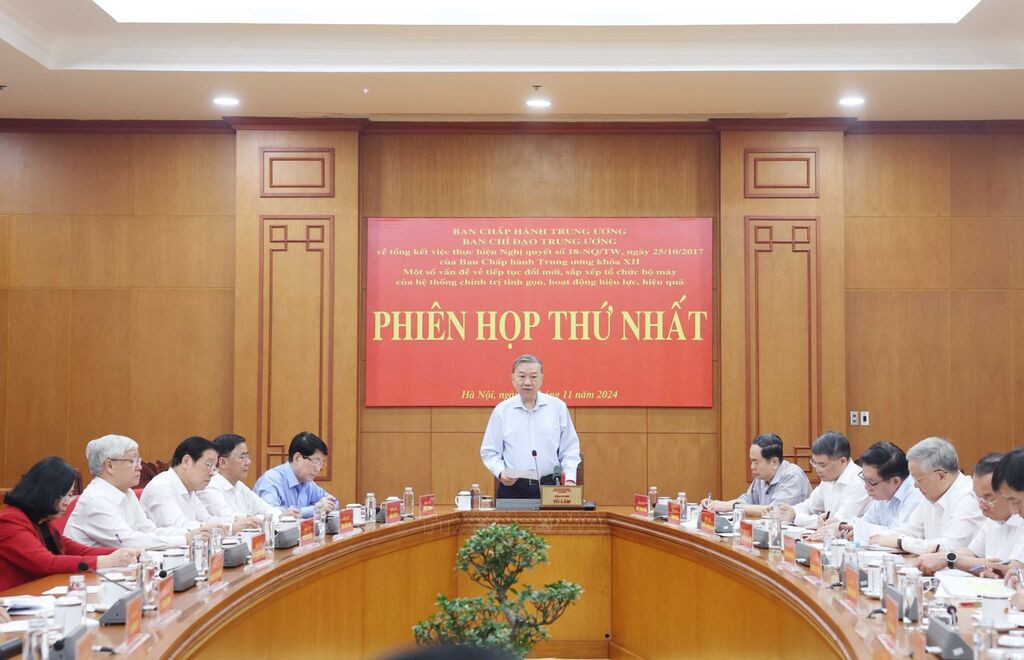General Secretary To Lam and the 13th Party Central Committee unanimously committed to a historic effort to restructure Vietnam’s political apparatus.
At a recent session, they emphasized that this initiative, labeled a "revolution," is essential to meet the demands of the modern era and must be completed before the 14th Party Congress.
This decisive reform effort has gained strong support from Party members, former leaders, and the public, who view it as a transformative step toward creating a more efficient and effective political system.
A revolutionary approach

The reform is centered around Resolution No. 18-NQ/TW, which aims to create a leaner, more efficient political apparatus. The emphasis on the term "revolution" reflects the urgency and significance of this initiative.
Prime Minister Pham Minh Chinh has established a governmental task force to oversee the streamlining process, signaling his administration's determination to drive the reform.
In the past, Vietnam’s government handled all aspects of economic planning, production, and distribution, resulting in an overly complex bureaucracy. Post-Doi Moi reforms reduced the government structure to 22 ministries and eight ministerial-level agencies, but inefficiencies persist. Overlapping responsibilities, unclear roles between central and local governments, and excessive administrative hurdles continue to stifle development.
Addressing systemic issues
General Secretary To Lam expressed frustration over inefficiencies, such as multiple ministries conducting overlapping research and unclear accountability in simple processes, like issuing birth certificates.
At a recent meeting, Hanoi’s Chairman Tran Sy Thanh highlighted how conflicting regulations in investment, land use, and urban planning have delayed projects for up to a decade.
Similarly, Deputy Prime Minister Nguyen Hoa Binh criticized excessive administrative delays that consume a project’s implementation timeline, impacting business operations.
The challenge is nationwide. In Da Nang, for example, over 1,200 projects are stalled due to legal entanglements, leaving no room for further development.
Cutting administrative fat

Despite previous efforts to cut red tape, such as the 2021–2024 reduction of 2,866 business regulations, Vietnam still has nearly 16,000 administrative requirements in place. This regulatory overload severely constrains both businesses and citizens.
Several anecdotes highlight the adverse effects of excessive bureaucracy:
Visa Extension: Proposals to extend visa-free stays for certain nationalities were delayed for years, only enacted after a scandal involving the Consular Department.
Vehicle Registration: Stringent and impractical vehicle inspection regulations were only lifted after officials in the Registry Department were arrested for corruption.
Food Safety: In 2018, a government decree simplified import inspections, saving businesses over 3,700 billion VND and millions of workdays. Despite initial resistance, the reforms did not lead to public safety issues.
These examples underscore the need for clear delineation between state and market responsibilities. As former National Assembly Chairman assistant Le Minh Thong observed, excessive state intervention undermines market efficiency. Instead, the government should focus on crafting transparent legal frameworks and ensuring fair competition.
General Secretary To Lam has emphasized the importance of consolidating responsibilities, ensuring each task has a designated agency accountable for its execution. Eliminating redundant roles and intermediary layers is critical to improving efficiency and reducing waste.
The path forward
The reforms outlined in Resolution No. 18-NQ/TW represent a bold attempt to modernize Vietnam’s governance model. This includes: Reducing overlapping functions; Streamlining administrative procedures.
Allocating resources for development and national security; Creating a governance framework suited to the digital age and new technologies like AI.
The stakes are high. A cumbersome political system not only delays the implementation of policies but also erodes public trust and limits economic opportunities.
As General Secretary To Lam stated, “Our system must evolve to match the rapid development of the country and advancements in science and technology. Without decisive action, we risk losing credibility and opportunities for growth.”
Tu Giang & Lan Anh